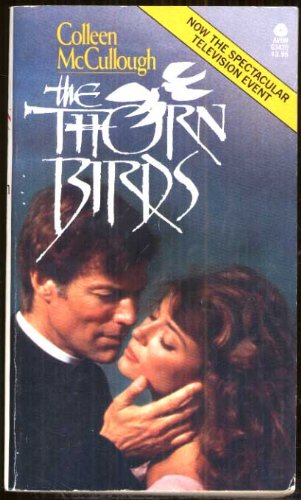Every so often, a truly remarkable book comes to those of us who love to read. It's a book that we may not think much of when we first read it, but slowly, over time, it becomes more than just a book. That is what Colleen McCullough's saga The Thorn Birds is to me. Maybe it was part destiny -- being born in 1983 (the year the novel was adapted into a miniseries) and being named after the main character, maybe I was meant to love this book. I've read it at least a dozen times, and I always come back for more.
Set in Australia in the first half of the 20th century, The Thorn Birds is the chronicle of a poor New Zealand-Irish family who strikes it rich when their elderly aunt wills them her home, a sheep ranch by the name of Drogheda. The only girl in a burgeoning family of sons, Meghann "Meggie" Cleary, rails against the confines of her Catholic upbringing to pursue the love of the man of her dreams. Fr. Ralph de Bricassart, the object of her affection, is a priest whose love for Meggie is surpassed by only one thing -- his ambition to be the "perfect" priest and a Cardinal of the Church. Thrown together and torn apart repeatedly by love, ambition, and rules, their story comes to an abrupt turning point when Meggie takes her fate into her own hands to steal what little happiness she knows she can, with results and consequences that neither she nor Ralph could possibly foresee.
To me, this is one of the greatest "love stories" of all time. The conception of a Catholic priest falling in love with a young woman is as old as time itself, and Thorn Birds has an almost Romeo and Juliet quality to it. Why does Ralph push Meggie away and pursue the priesthood when he loves her so? Why does Meggie go back to Ralph repeatedly when he brings her nothing but misery in denying her? The difference between Thorn Birds and Romeo and Juliet is deliberation. In Shakespeare's classic tragedy about imprudent child lovers, the titular hero and heroine are too young and foolish to realize the dire consequences of their actions. In Thorn Birds, Ralph and Meggie (especially Meggie) realize exactly what they are doing, and why, and the consequences of their actions if they are discovered.
The theme of the book -- suffering great pain to achieve one's heart's desire -- is one that resonates with me more than ever, through the years. McCullough's writing is beautiful and meaningful. The last paragraph, even thirteen years after my first reading, still rings with its message:
"The bird with the thorn in its breast, it follows an immutable law; it is driven by it knows not what to impale itself, and die singing. At the very instant the thorn enters, there is no awareness of the dying to come: it simply sings and sings until there is not the life left to utter another note. But we, when we put the thorns in our breast, we know. We understand. And still we do it. Still, we do it."
Rating: *****

No comments:
Post a Comment